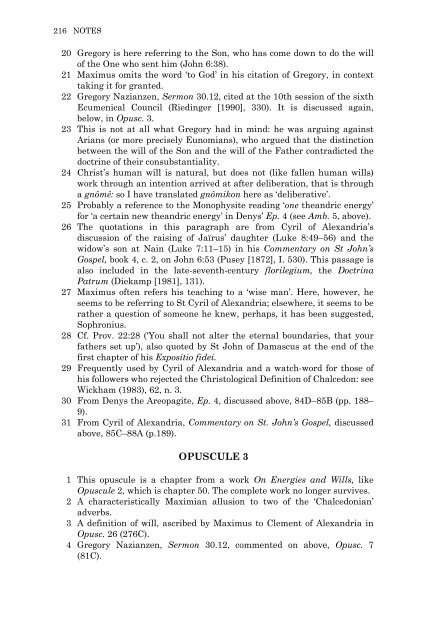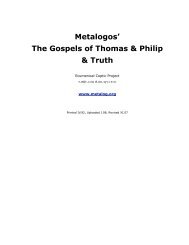Andrew Louth - Syriac Christian Church
Andrew Louth - Syriac Christian Church
Andrew Louth - Syriac Christian Church
You also want an ePaper? Increase the reach of your titles
YUMPU automatically turns print PDFs into web optimized ePapers that Google loves.
216 NOTES<br />
20 Gregory is here referring to the Son, who has come down to do the will<br />
of the One who sent him (John 6:38).<br />
21 Maximus omits the word ‘to God’ in his citation of Gregory, in context<br />
taking it for granted.<br />
22 Gregory Nazianzen, Sermon 30.12, cited at the 10th session of the sixth<br />
Ecumenical Council (Riedinger [1990], 330). It is discussed again,<br />
below, in Opusc. 3.<br />
23 This is not at all what Gregory had in mind: he was arguing against<br />
Arians (or more precisely Eunomians), who argued that the distinction<br />
between the will of the Son and the will of the Father contradicted the<br />
doctrine of their consubstantiality.<br />
24 Christ’s human will is natural, but does not (like fallen human wills)<br />
work through an intention arrived at after deliberation, that is through<br />
a gnômê: so I have translated gnômikon here as ‘deliberative’.<br />
25 Probably a reference to the Monophysite reading ‘one theandric energy’<br />
for ‘a certain new theandric energy’ in Denys’ Ep. 4 (see Amb. 5, above).<br />
26 The quotations in this paragraph are from Cyril of Alexandria’s<br />
discussion of the raising of Jaïrus’ daughter (Luke 8:49–56) and the<br />
widow’s son at Nain (Luke 7:11–15) in his Commentary on St John’s<br />
Gospel, book 4, c. 2, on John 6:53 (Pusey [1872], I. 530). This passage is<br />
also included in the late-seventh-century florilegium, the Doctrina<br />
Patrum (Diekamp [1981], 131).<br />
27 Maximus often refers his teaching to a ‘wise man’. Here, however, he<br />
seems to be referring to St Cyril of Alexandria; elsewhere, it seems to be<br />
rather a question of someone he knew, perhaps, it has been suggested,<br />
Sophronius.<br />
28 Cf. Prov. 22:28 (‘You shall not alter the eternal boundaries, that your<br />
fathers set up’), also quoted by St John of Damascus at the end of the<br />
first chapter of his Expositio fidei.<br />
29 Frequently used by Cyril of Alexandria and a watch-word for those of<br />
his followers who rejected the Christological Definition of Chalcedon: see<br />
Wickham (1983), 62, n. 3.<br />
30 From Denys the Areopagite, Ep. 4, discussed above, 84D–85B (pp. 188–<br />
9).<br />
31 From Cyril of Alexandria, Commentary on St. John’s Gospel, discussed<br />
above, 85C–88A (p.189).<br />
OPUSCULE 3<br />
1 This opuscule is a chapter from a work On Energies and Wills, like<br />
Opuscule 2, which is chapter 50. The complete work no longer survives.<br />
2 A characteristically Maximian allusion to two of the ‘Chalcedonian’<br />
adverbs.<br />
3 A definition of will, ascribed by Maximus to Clement of Alexandria in<br />
Opusc. 26 (276C).<br />
4 Gregory Nazianzen, Sermon 30.12, commented on above, Opusc. 7<br />
(81C).




